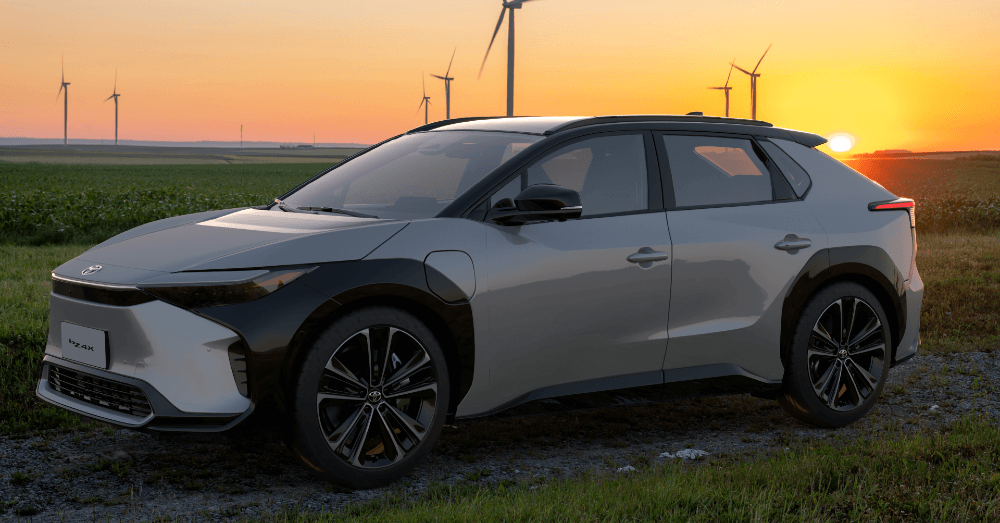Is Toyota going to get into the EV game to the same level as other automakers? New plans indicate this could happen soon.
Many automakers skipped over the hybrid movement and went straight to all-electric vehicles, but Toyota didn’t. For years, Toyota has been the leader in the market in terms of hybrid vehicles, and they have basically doubled down on electrically assisted powertrains. Nearly every Toyota and Lexus vehicle on the market has at least one hybrid powertrain. Some of the most popular Toyota names, such as the Camry, now come exclusively with hybrid powertrains, but this doesn’t answer the EV question.
Is Toyota going to be late to the party?
Whether it’s a calculated approach or a missed opportunity, Toyota didn’t go all-in for EVs when the boom began and the start of the decade. While many automakers shuttered nameplates in favor of electrified vehicles, Toyota grabbed a bag of popcorn and a large drink and sat back to watch the market. Sure, the bZ4X is available, but that’s mostly a vehicle that only barely touches the EV world.
Toyota might have had the right approach to electric vehicles and entering the market.
The EV world and its turmoil
More is always the expectation of industries, but should it be? Adding new electric vehicles at a rapid pace led to expectations from many automakers that their electric offerings would take over the market and gas-powered vehicles would soon be pushed aside. What they didn’t count on were the challenges associated with EVs. While EVs can replace a daily commuter vehicle easily enough, most aren’t capable of efficient road trips, requiring frequent stops to charge the batteries. Electric trucks can tow heavy loads, but that comes at a cost, significantly reduced driving ranges.
Toyota hasn’t been all-in on EVs, and that could be due to the growth in the hybrid market. While EVs had a spike, but they seem to be coming back to a level position in terms of sales. Unfortunately, if an automaker isn’t selling more vehicles than the previous year, it’s often viewed as a failure, but that can’t always be the case. At some point, sales have to level off or decline, but most automakers don’t predict these declines, and when they occur, it’s like a five-alarm fire went off in the industry.
Maybe, Toyota has had the right approach all along.
Late, but not out
Toyota might be late to the game, but the world’s largest automaker is never out of contention. Despite the slow approach to electric vehicles, Toyota expects to make a huge splash in the next few years. There should be 10 new EVs launched by 2027 under either the Toyota or Lexus brand names. This would triple the lineup worldwide. These new EVs will roll out in the United States, Europe, Japan, China, and Southeast Asia, adding new Toyota vehicles to the mix in the largest automotive markets in the world.
Production moving to the US
Toyota currently only builds EVs in Japan and China. EV sales for the brand were up last year by 34%, which translates to 140,000 models sold. It’s not enough to keep up with the EV giant in China, BYD, which sold more than 166,000 EVs in March. In order to capitalize on the American market, Toyota needs to move production to the US soil. They will begin to produce EVs in Kentucky and Indiana over the next couple of years, adding a three-row electric SUV to the mix.
Additionally, Toyota has begun building batteries in-house and will begin shipping them from its new North Carolina facility. This is the first overseas in-house battery plant for the brand and adds more to the American-made moniker that matters when selling vehicles in America.
Europe has another approach
Small vehicles still do extremely well in Europe. For that reason, three new Toyota electric SUVs will appear in Europe during the next few months. These new SUVs include an updated version of the bZ4x, C-HR+, and Urban Cruiser. These three should give Europe a strong surge, especially for those drivers who enjoy the Toyota brand and what it brings to the table.
The calculated approach could be the right one
Many automakers who were early to the EV market benefited from the initial sales surge, but now have electric vehicles sitting on dealership lots collecting dust. The market has slowed, or leveled off, which was predictable. It could finally be the right time for Toyota to go all-in on EVs, especially since the brand has so many hybrid alternatives for drivers who aren’t quite ready to give up their gas engines yet.
This post may contain affiliate links. Meaning a commission is given should you decide to make a purchase through these links, at no cost to you. All products shown are researched and tested to give an accurate review for you.
